

Teen literacies toolkit. Scope & Sequence: Common Sense K-12 Digital Citizenship Curriculum. InCtrl. SWGfL Digital Literacy - Home. Be Internet Awesome - About. 5 Awesome Elementary School Digital Citizen Activities. On one of our many walks to school, my 11-year-old son asked, “What are you blogging about these days, Dad?”
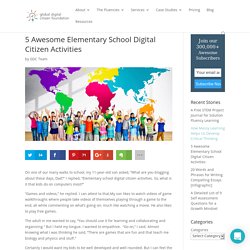
I replied, “Elementary school digital citizen activities. So, what is it that kids do on computers most?” “Games and videos,” he replied. I can attest to that.My son likes to watch videos of game walkthroughs where people take videos of themselves playing through a game to the end, all while commenting on what’s going on; much like watching a movie. He also likes to play free games. 18 Incredible Digital Citizenship Web Resources for Teachers. Every teacher can benefit from having some good digital citizenship Web resources available to share with students.
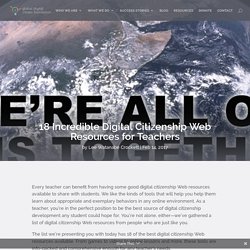
We like the kinds of tools that will help you help them learn about appropriate and exemplary behaviors in any online environment. As a teacher, you’re in the perfect position to be the best source of digital citizenship development any student could hope for. You’re not alone, either—we’ve gathered a list of digital citizenship Web resources from people who are just like you. The list we’re presenting you with today has 18 of the best digital citizenship Web resources available. A Better Roadmap to Global Digital Citizenship Practices. There’s lots to think about when it comes to ensuring guidelines for safety and proper etiquette for our digital students in their tech-oriented lives.
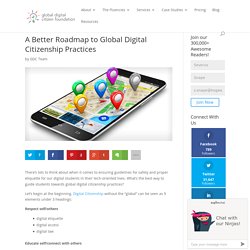
What’s the best way to guide students towards global digital citizenship practices? Let’s begin at the beginning. Digital Citizenship without the “global” can be seen as 9 elements under 3 headings: Respect self/others. Embrace Civility. Cyber Savvy is a student-led, positive norms approach to teach upper intermediate, middle, and high school students (grades 5 – 12) about digital safety, including effective digital decision-making, safe posting of personal information, digital relationships, social networking, cyberbullying, and digital dating/exploitation.
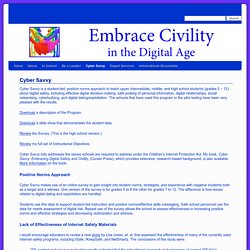
The schools that have used this program in the pilot testing have been very pleased with the results. Download a description of the Program. Download a slide show that demonstrates the student data. Review the Survey. (This is the high school version.) Review my full set of Instructional Objectives. Cyber Savvy fully addresses the issues schools are required to address under the Children’s Internet Protection Act. Digital Citizenship. KET School Video Project. Home - Generation YES. » Reflection: Digital citizenship in schools iPractice: Learning & Connecting.
May 25, 2015 The evolving context of digital landscapes and how these impact life and learning, is something I am keenly interested in.
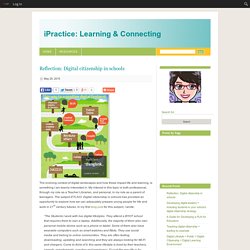
My interest in this topic is both professional, through my role as a Teacher Librarian, and personal, in my role as a parent of teenagers. 4 Global Digital Citizenship Myths—Debunked! Today, we acknowledge that the digital citizen is a global citizen.
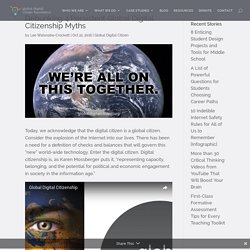
Consider the explosion of the Internet into our lives. There has been a need for a definition of checks and balances that will govern this “new” world-wide technology. Enter the digital citizen. Growing Good Digital Citizens. For anyone trying (like me) to get their head around the DigiTech curriculum, hopefully this can help get you.
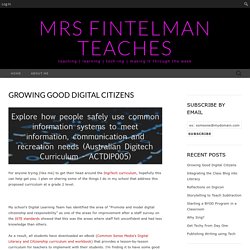
I plan on sharing some of the things I do in my school that address this proposed curriculum at a grade 2 level. My school’s Digital Learning Team has identified the area of “Promote and model digital citizenship and responsibility” as one of the areas for improvement after a staff survey on the ISTE standards showed that this was the areas where staff felt unconfident and had less knowledge than others. As a result, all students have downloaded an eBook (Common Sense Media’s Digital Literacy and Citizenship curriculum and workbook) that provides a lesson-by-lesson curriculum for teachers to implement with their students. I’m finding it to have some good resources but mostly it is a little dry. How to Become a Great Global Digital Citizen. There is something special about the Global Digital Citizen.
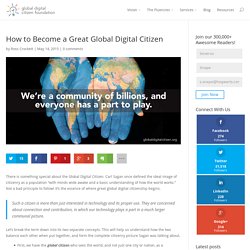
Carl Sagan once defined the ideal image of citizenry as a population “with minds wide awake and a basic understanding of how the world works.” Not a bad principle to follow! It’s the essence of where great global digital citizenship begins. Such a citizen is more than just interested in technology and its proper use. Digital Passport by Common Sense Media. Parenting in a Digital World. One of my roles as Consultant-in-Residence at NIST is to offer workshops for parents about technology and learning.
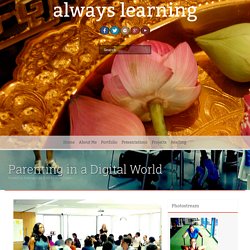
Having done the same thing at both ISB and YIS for the last eight years, this is something I know parents appreciate, and really helps support the type of teaching and learning we want to happen at school by giving parents a deeper understanding of why we do what we do. When I’m full-time employed by a school, I usually run these sessions every month, and mix and match the concepts based on what parents are interested in, what’s going on at the school, what’s making headlines, and what I think parents should know (you can see all the sessions we ran at YIS here).
However, as a consultant, instead of regular sessions throughout the year, because my schedule changes so much, we developed a four-session, mini-course for parents. The dates were set in advance, and parents signed up for the whole set of four. Parents enjoy workshops too! Share your resources Under-plan Be prepared. ISTE Standards. Education technology standards to transform learning and teaching The time for major change in education is now.
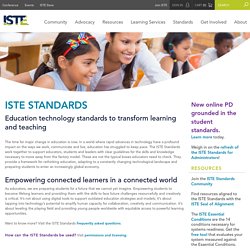
In a world where rapid advances in technology have a profound impact on the ways we work, communicate and live, education has struggled to keep pace. The ISTE Standards work together to support educators, students and leaders with clear guidelines for the skills and knowledge necessary to move away from the factory model. These are not the typical boxes educators need to check. Can you teach digital citizenship, if you are not an active digital citizen yourself? It seems that a number of participants in my Digital Citizenship workshop imagined they’d be learning about cyber safety for three days! Is that what comes to mind for some people when they hear the term digital citizenship? Instead, we explored what it means to BE a digital citizen and, by the end of the workshop, every one of them had become an active contributor online, developing confidence to participate as thoughtful, active citizens themselves. Can you teach digital citizenship, if you are not an active digital citizen yourself?
During the workshop, participants reflected on the ways they engage online and categorised their online activities under the headings of CONSUME, CREATE or INTERACT. Participants also… Some of the action… Take a look at the brand new professional blogs by Tania, Joel and Leona and follow up on the action via Twitter… I’m thinking about all the authentic learning about to happen in a real context… Like this: Like Loading...
What Your Students Really Need to Know About Digital Citizenship. In my classroom, I use two essential approaches in the digital citizenship curriculum that I teach: proactive knowledge and experiential knowledge. Proactive Knowledge I want my students to know the “9 Key Ps” of digital citizenship. While I go into these Ps in detail in my book Reinventing Writing, here are the basics: 1. Parenting in the Digital World – A Curriculum for Teaching Parents about Cybersafety, Digital Citizenship, and Effective Computer Use – 2015 Lausanne Learning Institute.
A Better Roadmap to Global Digital Citizenship Practices. There’s lots to think about when it comes to ensuring guidelines for safety and proper etiquette for our digital students in their tech-oriented lives. What’s the best way to guide students towards the practices of global digital citizenship? Let’s begin at the beginning. Digital Citizenship without the “global” can be seen as 9 elements under three headings: Respect self/others. Digital Citizenship for Elementary Kids: 6 Awesome Activities. On one of our many walks to school, my 11-year-old son asked, “What are you blogging about these days, Dad?” I replied, “Digital Citizenship and elementary kids. So, what is it that kids do on computers most?” “Games and videos.” I can attest to that. My son likes to watch videos of game walkthroughs where people take videos of themselves playing through a game to the end, all while commenting on what’s going on; much like watching a movie.
Digital Passport by Common Sense Media. Global Digital Citizenship Program. Cyber Safe Kids - New site coming soon. Home. Our Space: Being a Responsible Citizen of the Digital World. For most young people today, engagement with new digital media is a routine aspect of life. Through computers, mobile phones, and other handheld devices, youth can blog, tweet, participate in social networks like Facebook, play massive multi-player games, use online information sources, and share videos, stories, music, and art they’ve created.
Important skills and knowledge can be gained from such activities, but there are also risks. For example, young people may only rarely consider what it means to be an ethical, socially responsible “citizen” on the Internet. Our Space is a set of curricular materials designed to encourage high school students to reflect on the ethical dimensions of their participation in new media environments.
Global Digital Citizen Foundation. iCyberSafe.com – Living in a Connected World. Digital Literacy and Citizenship Curriculum – Know your web – Good to Know – Google. At Google we believe in the power of education and the promise of technology to improve the lives of students and educators -- leading the way for a new generation of learning in the classroom and beyond.
But no matter what subject you teach, it is important for your students to know how to think critically and evaluate online sources, understand how to protect themselves from online threats from bullies to scammers, and to think before they share and be good digital citizens. Google has partnered with child safety experts at iKeepSafe, and also worked with educators themselves to develop lessons that will work in the classroom, are appropriate for kids, and incorporate some of the best advice and tips that Google's security team has to offer.
Class 1: Become an Online Sleuth In this class, students will identify guidelines for evaluating the credibility of content online. We are always looking to improve these classes.